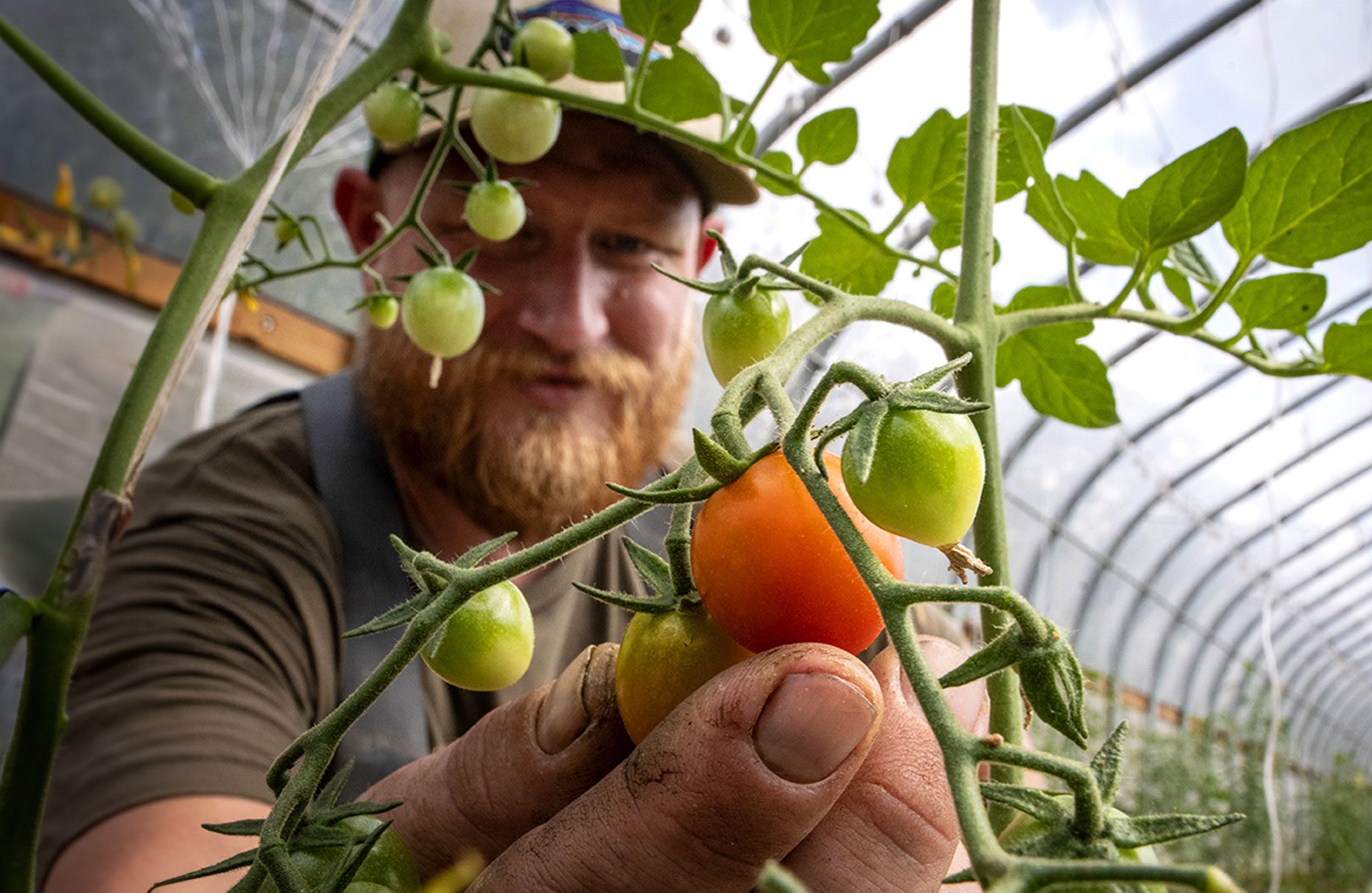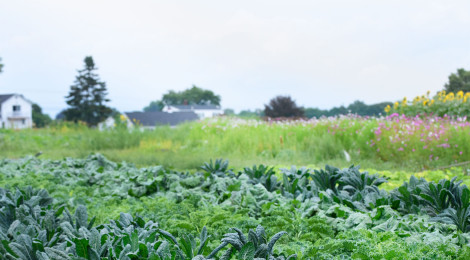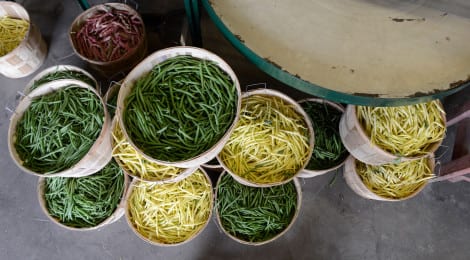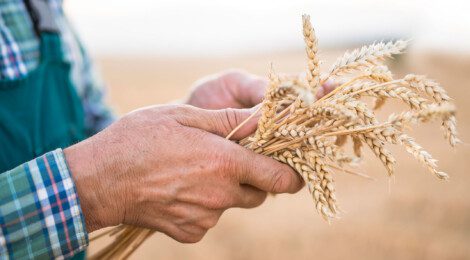
Food Vision Prize, HPKF News
2023 New England Food Vision Prize Winners
The Henry P. Kendall Foundation is pleased to announce the winners of the 2023 New England Food Vision Prize, a multi-year commitment aimed at building resiliency, relationships, and capacity within New England’s farm to institution food supply chain.
Thirty-eight project teams submitted ideas for the 2023 Prize. A total of nine were chosen as this year’s winners, bringing together public school districts and higher education institutions with farmers, distributors, food hubs, and other food system stakeholders to expand collaboration and increase regionally produced food in education institutions across New England.

Connecting Maine’s Supply with Southern New England’s Demand
Farm Fresh Rhode Island (RI), in collaboration with Boston Food Hub, Harvesting Good, and Smithfield Public School District, was awarded $200,000 to expand the supply chain linking Maine-grown broccoli with the robust network of K-12 schools, colleges, and institutions in southern New England. The project team will build the partnerships and infrastructure to connect Maine’s supply with New England’s demand and offer lessons learned for future efforts, scaling, and replication.
Facilitating Local Procurement in Connecticut’s Culinary Classroom
Yellow Farmhouse Education Center (CT), in partnership with the Stonington Public School District, Healthy PlanEat, and UConn Extension’s Put Local on Your Tray Program, was awarded $45,000 to research and activate the purchasing power of Family & Consumer Science teachers in Montville, Fitch, and Middletown High School. The project’s goal is to support these teachers in allocating 25% of their culinary program budget to regionally produced food, which could result in an estimated $500,000 flowing to local farms and food producers.
Farm to School Integration for Beginning BIPOC Farmers
Pocasset Pokanoket Land Trust (RI), in collaboration with Open Farms Retreat, Cumberland School District, Roch’s Fresh Foods, and Northeast Organic Farmers Association – MA, was awarded $120,300 to support a two-year program designed to create a direct farm-to-school pathway in Cumberland, Rhode Island. Funding will support new farm infrastructure and required certifications, beginning-farmer technical assistance and training, and school and community engagement efforts.
Food Connects Scaling Up to Meet K-12/Higher Education Demand
Food Connects (VT), in partnership with Bennington College, White River Valley Supervisory Union, and Windham Northeast Supervisory Union, was awarded $199,788 to expand the values-driven wholesale distribution system that provides Vermont, Western Massachusetts, and Southern New Hampshire’s educational institutions with access to source-identified New England regional foods. Funding will help increase sales capacity, onboard additional products through new and existing supply chains, and achieve approved vendor status with food service management companies.
Improving K-12 Farm to School Access in Western Vermont
Addison County Relocalization Network (VT) was awarded $95,782 to work with six school districts in Vermont’s Addison, Chittenden, and Rutland counties to strengthen local food procurement in K-12 schools as well as with Middlebury College, the largest food purchaser in Addison County. Prize funding will allow the Addison County Relocalization Network to facilitate the aggregation, sales, and distribution of significantly more local food through their growing food hub in Vermont’s Champlain Valley.
Keney Park Sustainability Project & Hartford Public Schools Local Collaborative Kitchen
The Keney Park Sustainability Project (CT), in partnership with Hartford Public Schools, was awarded $200,000 to establish and operate a prep kitchen that will streamline the aggregation and processing of locally grown produce specifically for Hartford’s school kitchens and cafeterias. This new facility will meet district needs while providing an important market for local farmers and consistent, fresh locally grown produce for Hartford’s 13,000 students.
Lowell Eats Local
University of Massachusetts Lowell (MA), along with its partners Mill City Grows, Lowell Public Schools, Aramark, and the Asian American Center for Excellence & Engagement, has been awarded $199,500 to lead the Lowell Eats Local project. Bringing together nonprofits, public K-12 schools, and contract dining providers, the project will significantly increase local food purchases at UMass Lowell, develop culturally connected menu options with specialty ingredients, and coordinate city-wide food purchases to change the food distribution and Greater Lowell food aggregation systems.
Maine Immigrant Greens Collaborative
Wayside Food Programs (ME) has been awarded $199,950 to support the Maine Immigrant Greens Collaborative; a project involving Westbrook School District, South Portland Public School Department, Farms for Food Equity, Lewiston Public School District, Isuken Co-Op, Maine Farm and Sea Cooperative, and Atlantic Sea Farms. This project increases the use of locally grown, hearty greens (collard greens, kale, and up-cycled brassica leaves) in K-12 schools. By developing a unique partnership between agriculture’s production capacity and aquaculture’s processing facilities, this work will help to meet community-determined needs of immigrant and asylum-seeking families in Maine.
Preserving Surplus Produce to Aid the Re-localization of School Food Sourcing
Salvation Farms (VT), with partners Lamoille South Supervisory Union, Lamoille North Supervisory Union & School District, and The Abbey Group, has been awarded $168,875 to create a line of cost competitive, frozen foods for K-12 schools utilizing locally grown, surplus crops. The learning, experimentation, and partnership development during this two year project has the potential to shift existing systems, processes, and ways of working that have impacted institutional buyers’ ability to access local food in a cost effective and operationally efficient way.
The New England Food Vision Prize, named for the regional goal of producing 50% of New England’s food within the region by 2060, was launched in 2018 by the Henry P. Kendall Foundation. Its focus is to combine the food purchasing power of educational institutions in the region with the engagement of its students – the future consumers in the region – to increase the amount of regionally produced food on their menus.
The Prize was suspended for two years during the COVID-19 pandemic (2020 and 2021). The 2022 Prize expanded eligibility and focus from colleges and universities to include school districts, other institutions, and community-based organizations across New England.
The Henry P. Kendall Foundation would like to thank this year’s proposal reviewers for their participation in the Prize program. Each of these individuals brought important personal and professional experience and varying perspectives that added immense value to the review process.
Reviewers are assigned a subset of proposals based on subject matter expertise and provide written and numerical feedback to Foundation staff via the Food Vision Prize rubric.
Samantha Wilson, Child Nutrition Director at New London Public Schools, CT: Upon graduating from The University of Connecticut with a BS in Dietetics, Samantha immediately found her passion in the K-12 food space. She strongly believes all students deserve access to high quality food in schools and applies a holistic approach to that belief. During her tenure in New London, and through key partnerships with Brigaid and FoodCorps, she has transformed the meal program by implementing scratch cooking, growing the farm to school program, and increasing cafeteria-classroom engagement district wide.
Caitlin Tenorio, Education Partnerships Manager at 88 Acres: Caitlin currently works as the Education Partnerships Manager at 88 Acres, a Boston-based company making seed bars, butters and granola with whole seeds and simple ingredients. Prior to her role at 88 Acres, she served as the Procurement & Contracts Manager at Boston Public Schools Food and Nutrition Services.
Jess Stone, Cold Spring Farm, CT:Jess Stone is co-owner of Cold Spring Farm in Colchester, Connecticut. Cold Spring Farm is a diversified vegetable and livestock farm with a holistic approach that grows vegetables, fruits, flowers, and herbs and raises cows, sheep, pigs, goats, chickens, ducks, geese, peacocks, dogs, cats, and kids! Cold Spring Farm sells direct to consumers through farmers markets, a year round CSA, and a farm stand, and sells wholesale farm products to schools and institutions. An active member of farm to school efforts at the local and state level, Jess brings her 25 years of experience as a farmer to advocate for a healthy, resilient, and regional food system.
Mellissa Honeywood, Director of Food & Nutrition Services for Cambridge Public Schools in Massachusetts: Honeywood has had the privilege of working alongside some inspiring folks throughout her food service journey. Each doctor, dishwasher, teacher, truck driver, fisherman, farmer, first grader, politician, professor, parent, and school food hero has informed Honeywood’s understanding of our complex food system. During her 11-year tenure in Cambridge, Massachusetts as the Director of Food & Nutrition Services, the district’s school meals have evolved to include more locally sourced items, vegetarian protein sources, and international recipes that reflect the diversity of the student community. Mellissa serves as an Advisory Board Member of the Chef Ann Foundation as well as an Advisory Board Member for the Massachusetts Farm to School Network.
Thai Ha-Ngoc, Senior Finance Manager, Target: Thai is a Senior Finance Manager at Target where he currently leads the company’s long range planning process to support growth and investment decisions. He has also held finance roles in Target’s Global Supply Chain & Logistics and Grocery businesses. Prior to Target, Thai was the Director of Finance and Operations at Daily Table, an innovative not-for-profit grocery retailer focused on supporting affordable nutrition in underserved communities. Thai also worked at the Henry P. Kendall Foundation as a Program Associate, helping to create a resilient and healthy food system in New England. Thai received his MBA from the University of Michigan and BA in Economics and Environmental Studies at Bowdoin College. When not at work, Thai enjoys cooking, playing racquet sports and spending as much time outside with his wife, daughter and lab-mix rescue.
Leslie Ekstrand: Leslie Ekstrand is a retired chef and food service professional who provided high-quality, fiscally-responsible culinary and service experiences for over 20 years in corporate and university dining while incorporating local and sustainable foods and green business practices. Leslie has served on the Farm to Institution New England Steering Committee and is a Master Wellness Volunteer for the University of New Hampshire Cooperative Extension program.
Melissa Motejunas, Procurement & Strategic Accounts Manager at Native Maine Produce: As Procurement & Strategic Accounts Manager at Native Maine Produce, Melissa leads the company’s local Procurement, advocacy, and community outreach work while managing a portfolio of more than 600 accounts comprising schools, non-profits, and institutions across Maine and New Hampshire. Melissa has established relationships with Maine and NH’s Department of Education and the Farm to School Network and works to develop creative and efficient solutions to improve government program efficiencies by prioritizing fruit and vegetable consumption. Melissa is a lifelong Mainer with a deep connection and passion for children, education, advocacy, and food. She serves on the Political Advisory Committee for the International Fresh Produce Association and the Network Advisory Committee for FINE. She is also a member of the Maine Food Convergence and Maine Farm and Sea to School.
Damaris Hall, Co-Founder and COO of Global Village Foods: Damaris Hall is co-founder and COO of Global Village Foods, ready to eat allergy friendly meals with bold African flavors. A trained chef and allergy-mom, Damaris grew up on her family’s farm in Kenya enjoying traditional foods with fresh ingredients. With a passion for good food, community and sustainability, Damaris, and her husband & cofounder Mel Hall, started serving African flavors at local Farmers markets and later ran a successful African restaurant in White River Junction, VT. With years of experience in the food industry, Damaris has worked to successfully grow the idea of authentic African cuisine, from a home kitchen concept to a CPG brand. When not working, Damaris enjoys hiking, gardening, and spending time with family & friends.
Mel Hall, Co-Founder and CEO of Global Village Foods: Mel Hall, co-founder and CEO of Global Village Foods, has lived in the Upper Valley of VT/NH since 1987. Originally from Memphis, Tn., and a Vermont resident for decades, he currently focuses on strategic direction for the Global Village Foods brand both in food service & in the CPG space. Prior to co-founding Global Village Foods, Mel and his wife ran a successful African restaurant in White River Junction, VT. Mel is passionate about growing sustainable food systems and community based action in the good-food-space, both locally, nationally and abroad. Our vision is to source Vermont and regionally grown agricultural produce to the greatest degree possible thereby spurring local economic activity with regional local growers. Together with wife and co-founder Damaris Hall, they seek to create career paths & living wage employment and support for their fellow crew members.
Karl Dias, Founder and CEO, Fat Boy Foods: Karl is founder and CEO of FATBOY Foods and its New England Made brand. As a USDA Certified Organic co-packer with operations in West Bridgewater, Massachusetts and Lincoln, Rhode Island, Karl specializes in producing value-added products, often from locally-sourced ingredients. Early in his career, visits to regional farms sparked an interest in helping growers make the most of their crops, particularly the “ugly” or processing fruit not destined for supermarkets. Today, his work is focused on applesauce and purees of fruits and vegetables from growers throughout New England. In developing an extensive network of regional farmers, buyers and distributors, Karl has partnered with large institutions with programs committed to the use of local produce, such as Harvard and Tufts University, as well as regional organizations devoted to bringing local produce to schools and other institutions, such as Massachusetts Farm to School and Worcester Food Hub.


